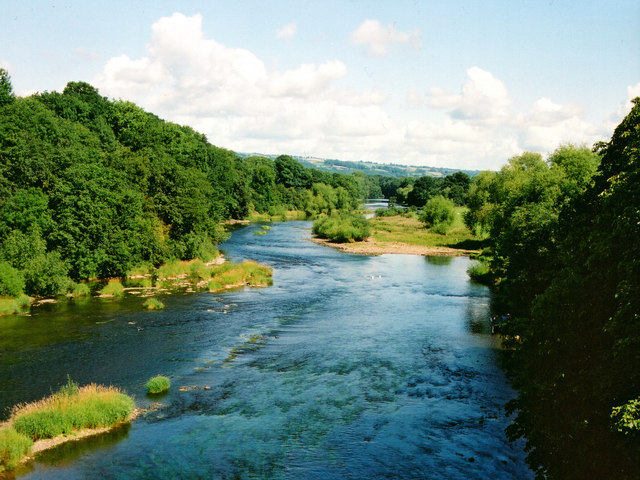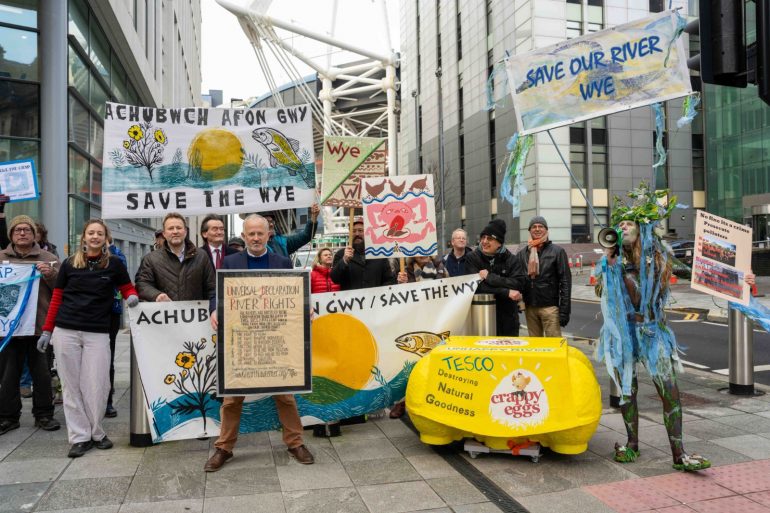Environment Agency had denied allowing excessive manure to enter the water
A COURT hearing into whether the Environment Agency unlawfully allowed chicken poo to pollute the River Wye has concluded in Cardiff.
River Action argued that the Environment Agency has allowed farmers to dispose of chicken manure in excessive quantities on their land.
A judgement has been reserved until a future date.
On the first day of the hearing a group of protesters gathered outside Cardiff Civil Court to protest pollution in the River Wye. The river previously had its Natural England health rating downgraded in 2023 after it saw a decline in fish numbers.
Protesters banged drums, chanted and paraded a large effigy of the “Goddess of the Wye”. Rock star turned campaigner Feargal Sharkey of The Undertones also attended, carrying a framed copy of the Universal Declaration of River Rights.
The court proceedings took place on Wednesday and Thursday. The Environment Agency denies the claim that it failed to enforce environmental regulations on farmers.
David Wolfe KC, barrister for River Action, told the court on Wednesday: “The Farming Rules for Water are not being lawfully enforced by the defendant, which is allowing farmers to continue to break the law.”
“The Farming Rules for Water are not being lawfully enforced by the defendant, which is allowing farmers to continue to break the law.”
David Wolfe KC
He also said that nutrient run-off was causing “ecological damage” to the Wye.
The Farming Rules for Water were introduced in 2018 to prevent water pollution from agricultural practices. Regulation states that land managers must ensure that the application of organic or manufactured fertiliser or manure does not “exceed the needs of the soil and crop on that land or give rise to a significant risk of agricultural diffuse pollution”.
Excess spreading of chicken manure, which is naturally high in nitrogen and phosphorus, can cause run-offs into rivers and lead to a rise in water toxicity and algal blooms.
“It simply cannot be said that the agency is misunderstanding the Farming Rules for Water and not taking action,” a lawyer for the Environment Agency went on to tell the court on Thursday.
Outside of the courtroom, farming groups have argued that they want to implement more sustainable agricultural practices, but have not always received the support and investment they need to be able to do so.
Deputy President of the National Farmers’ Union Tom Bradshaw said that the use of organic manures was a typical and sustainable farming practice, but that “the farming industry can and wants to do more to improve river water quality”.
The farming industry can and wants to do more to improve river water quality”
Tom Bradshaw, NFU
“The NFU recognises the need to protect the environment; however, we also believe it is important that legislation is interpreted and applied correctly and proportionately by the Environment Agency and Defra.
“The NFU has decided to intervene in the legal challenge being brought by River Action to ensure that our members’ interests are represented before the court on this critical issue.”
The poultry industry in Wales has seen exponential expansion over recent years, and the poultry farms in the catchment area of the River Wye are home to more than 20 million chickens. But there has also been backlash and concern about this expansion – a study by Lancaster University in 2022 recommended an 80 per cent reduction in poultry manure in the catchment area of the river to protect its ecosystem.
“Our rivers have been degraded and polluted from years of lax regulation. Local councils have granted permission for massive poultry units along the Wye, and agricultural runoff has devastated the river’s ecosystems,” said Green Party Leader for Wales, Anthony Slaughter.

A spokesperson for the Environment Agency said: “Since 2021 we have performed more than 7,000 farm inspections and required farmers to carry out over 11,400 improvement actions, including around the River Wye.
“These range from improving slurry storage to better management of nutrients. Our inspection regime is supported by the use of technology such as satellite images and drone footage. Anyone caught breaching environmental laws faces enforcement action, up to and including prosecution.
“We are unable to comment on ongoing legal proceedings.”



